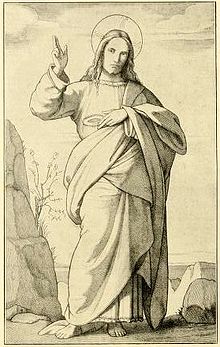Anton Hungari

Anton Hungari (born May 10, 1809 in Mainz , † December 17, 1881 in Rödelheim am Main ) was a Catholic priest , poet, writer and publicist.
Life
Anton Hungari was born in Mainz in 1809 as the son of a very poor family of tailors and first attended the high school attached to the local seminary. From 1830 he moved to Giessen to study theology . Because of his neediness, the Mainz bishop Joseph Vitus Burg supported him with a donation. In 1833 he returned to his hometown and entered the seminary there. The writer Otto von Corvin (1812–1886) records in his autobiographical memoirs “From the life of a people's fighter” that Anton Hungari was known in Mainz at this time because of his opposition to the authoritarian government and that he and his fellow officers, who were the liberal Should suppress efforts that would have had this “excellent on the line”.
On April 2, 1835, Hungari was ordained a priest in Limburg an der Lahn . He looked then as chaplain at St. Ignatius (Mainz) , in Heppenheim (Bergstrasse) , Dieburg and Gernsheim . When a Catholic pastoral post was created in Rödelheim near Frankfurt for the first time since the Reformation in 1842, Anton Hungari took over this position and stayed there until his death in 1881.
In Rödelheim belonged the wealthy banker Georg Brentano (1775–1851), grandson of the poet Sophie von La Roche (1730–1807) and brother of the two romantic poets Bettina von Arnim (1785–1859) and Clemens Brentano (1778–1842) the members and benefactors of Pastor Hungari's parish; Many great minds frequented Brentano's domicile, with its beautiful park. The mayor of Frankfurt, Georg Friedrich von Guaita (1772-1851), Georg Brentano's brother-in-law, was also a member of Rödelheim's Catholic community and was a committed supporter of it. It is the current parish of St. Antonius Rödelheim , which got a new church in 1894. The old church from Hungari's time, a converted tannery on Rebstöcker Weg, no longer exists.
Pastor Anton Hungari died in Rödelheim in 1881 . His grave is preserved in the local cemetery.
The priest was close friends with seminar rain Markus Adam Nickel (1800–1869) in Mainz, to whom he also dedicated one of his sermon works.
Poet and publicist
Anton Hungari had a strong literary disposition. Even before his ordination he wrote occasional poems, some of which were also published; for example one with the title “Lebewohl an die Heimat” , which he created in Gießen in 1830 and which appeared in the Frankfurt entertainment paper “Didaskalia or Leaves for Spirit, Mind and Publicity” . Presumably this interest had caused his application to the Rödelheim parish, which owed its establishment largely to the efforts of the Brentano family and their spiritual environment. As the chaplain of St. Ignaz in Mainz, Hungari had published the devotional books “Theomela” and “Holy Sacrifice of the Heart” in 1837 , which also contained his own poems, songs and prayer texts. In 1839 a sermon volume followed under the title “Christian speeches on Sundays and festive days, held in the St. Ignatius Church in Mainz” . Mainly during his activity in Rödelheim, Pastor Hungari published his own poems, stories and sermon works, but even more he collected such works by other authors, often from scattered, inaccessible sources, arranged them thematically and published them in many serial volumes. He published 42 volumes of sermons and 24 volumes of short stories under the collective title “Katholische Volksbibliothek” and “Neue Katholische Volksbibliothek” , as well as several poems.
To illustrate Hungari's 1843 “Cathedral of the Saints: For the Honor of the Most Holy Trinity. The most complete Catholic prayer and devotional book from the writings and life acts of the saints ” made the famous artist Eduard von Steinle (1810–1886) the picture “ Christ showing his wounds ” .
Anton Hungari saved many poems, short stories, but also sermons by famous contemporaries, from being completely forgotten by including them in his extensive compilations, which is where his lasting significance lies.
literature
- Heidrun Alzheimer-Haller: Handbook for narrative public enlightenment , Walter de Gruyter, 2004, p. 558, ISBN 3-11-017601-7 Scan to Anton Hungari from this source
- Wilhelm Binder: Allgemeine Realencyclopädie , Volume 11, Manz Verlag, Regensburg, 1849; Scan from the source
- Joseph Kehrein : Biographical-literary lexicon of the Catholic German poets, folk and youth writers in the 19th century , Volume 1, 1868, p. 168; Scan from the source
- Moriz Brühl: History of Catholic Literature in Germany from the 17th Century to the Present , 1854, pp. 633–634; Scan from the source
- Manfred Brandl: The German Catholic Theologians of Modern Times: A Repertory , Volume 3: The Nineteenth Century, Part 1, 2006, p. 320, ISBN 3-85376-268-9 , partial scan from the source
Web links
- Record in the portal thesaurus
- PDF document, register of the University of Giessen, Anton Hungari and his brother Jakob Hungari on page 85
Individual evidence
- ↑ In support of Bishop Burg
- ↑ Otto Corvin: “From the life of a people's fighter” , page 331
- ↑ Dates for ordination
- ^ Website on Georg Brentano and his Rödelheim property
- ↑ Photo of the grave
- ^ Scan of the poem from 1830
- ↑ Contemporary review of the devotional book "Theomela"
- ↑ To the works "Theomela" and "Holy Sacrifice of the Heart"
- ^ Source to the first works of Anton Hungari
- ↑ Contemporary advertisement for Hungari's compilation "Katholische Volksbibliothek"
- ↑ Source for the production of the Steinle picture for Anton Hungari's prayer book
| personal data | |
|---|---|
| SURNAME | Hungari, Anton |
| BRIEF DESCRIPTION | German clergyman, writer and publicist |
| DATE OF BIRTH | May 10, 1809 |
| PLACE OF BIRTH | Mainz |
| DATE OF DEATH | December 17, 1881 |
| Place of death | Frankfurt-Rödelheim |

